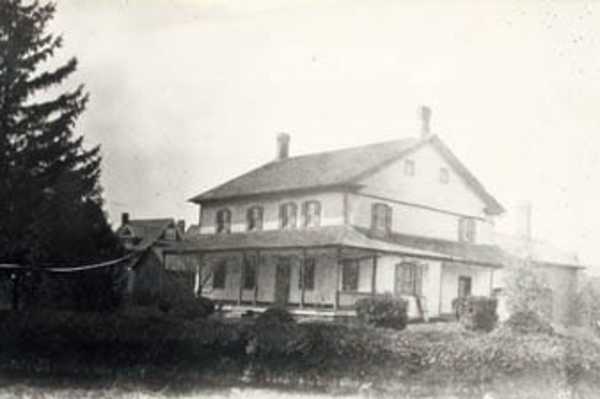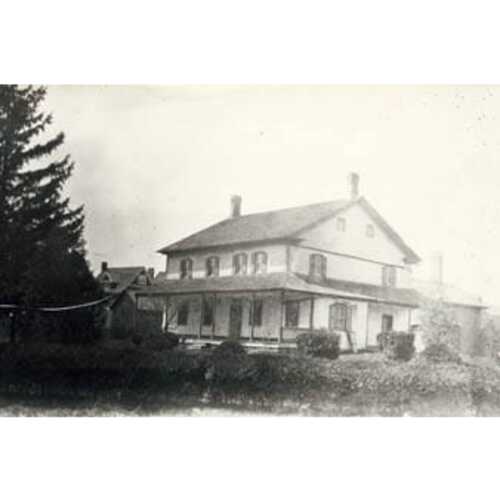
Source: Link
SCHNEIDER, JOSEPH, settler and sawmill owner; b. 24 May 1772 in Lancaster County, Pa, son of Jacob B. Schneider and Maria Herschi; m. 21 Feb. 1798 Barbara Eby, sister of Benjamin Eby*, and they had seven children; d. 27 Oct. 1843 in Berlin (Kitchener), Upper Canada.
Joseph Schneider’s father immigrated with his parents to Pennsylvania from the Palatinate (Federal Republic of Germany) in 1736. In 1806, three years after Jacob’s death, two of his sons, Christian and Jacob, settled in block 2 (Waterloo Township), in the vicinity of present-day Kitchener. Joseph and a group of other Mennonites followed them, making the month-long journey in horse-drawn wagons. Schneider purchased and settled on lot 17 of the German Company Tract of block 2. It was the attraction of inexpensive land, as well as the desire to remain under British rule in the years after the American revolution, that brought many Mennonites to the area, among them Benjamin Eby and Samuel D. Betzner*. Geographical isolation allowed them to practise their religion and language freely, although at first it forced them to travel to such centres as Dundas for supplies and services.
Schneider was an active figure among the Mennonite settlers and, with Eby, is often regarded as a founder of Kitchener. He helped open the first local road, which ran from his farmstead to the Dundas road and was known as Schneider’s road until the 1870s. In 1808–9 he and four other heads of families hired a teacher to open the first school in the area. He was involved four years later in the building of the first Mennonite meeting-house, headed by Eby; in 1834 Schneider participated in the construction of a new church. Perhaps as early as 1816 he had built a sawmill on what is still known as Schneider’s Creek, and in the 1820s a blacksmith shop and tavern were erected by Phineas Varnum on land leased from Schneider. Together these enterprises formed the commercial nucleus of the developing village, known variously as Sand Hills, Ebytown, and, later, Berlin. In 1835 Schneider strongly supported the establishment of its first newspaper, Heinrich Wilhelm Peterson*’s Canada Museum, und Allgemeine Zeitung, of which he was a stockholder.
Schneider died on 27 Oct. 1843. Among the possessions he left to his family were traditional objects valued by Pennsylvania Germans, including a tall case clock, the works for which he had brought with him in 1807. The clock still stands in the house he built about 1820, Kitchener’s oldest structure and now a museum. In other local collections are two family bibles: one, in the Mennonite Archives of Ontario, a rare edition published in Zurich in 1560 by Christoph Froschauer and brought to Upper Canada by Schneider; the other, in the possession of a descendant, printed in Lancaster County in 1805 and containing striking examples of fraktur (ornamental writing), executed by teacher-artist Jacob Schumacher in 1821.
Schneider’s farming and milling operations were continued by his youngest son, Joseph E., who in 1849 had the family’s history printed in Berlin in a small booklet, possibly the earliest published genealogy in Canada. In 1874 he was a charter member of the Reforming/Reformed Mennonites (later the Missionary Church) .
Toronto and York Land Registry Office (Toronto), “Old York County,” deeds, 5, no.1839 (mfm. at AO). Waterloo South Land Registry Office (Kitchener, Ont.), Waterloo Township, abstract index to deeds, German Company Tract, lot 17 (mfm. at AO). E. E. Eby and J. B. Snyder, A biographical history of early settlers and their descendants in Waterloo Township, with Supplement, ed. E. D. Weber (Kitchener, 1971), 136. John English and Kenneth McLaughlin, Kitchener: an illustrated history (Waterloo, Ont., 1983). Hannes Schneider and his wife Catharine Haus Schneider, their descendants and times, 1534–1939, ed. J. M. Snyder (Kitchener, [1940]). Herkommen und Geschlechts Register der Schneider Familie (Berlin [Kitchener], 1849). P. G. Klassen, “A history of Mennonite education in Canada, 1786–1960” (d.ed. thesis, Univ. of Toronto, 1970), 73–74. W. V. Uttley, A history of Kitchener, Ontario (Kitchener, 1937; repr. [Waterloo, 1975]), 17. M. [H.] Snyder Sokvitne, “The Joseph Schneider house, 1820,” Waterloo Hist. Soc., [Annual report] (Kitchener), 1966: 20–27. W. V. Uttley, “Joseph Schneider: founder of the city,” Waterloo Hist. Soc., Annual report (Waterloo), 1929: 111–19. G. K. Waite, “Joseph Schneider sawmill operations, 1848–1859,” Waterloo Hist. Soc., [Annual report], 1985: 57–65.
Cite This Article
E. Reginald Good and Paul Tiessen, “SCHNEIDER, JOSEPH,” in Dictionary of Canadian Biography, vol. 7, University of Toronto/Université Laval, 2003–, accessed December 18, 2025, https://www.biographi.ca/en/bio/schneider_joseph_7E.html.
The citation above shows the format for footnotes and endnotes according to the Chicago manual of style (16th edition). Information to be used in other citation formats:
| Permalink: | https://www.biographi.ca/en/bio/schneider_joseph_7E.html |
| Author of Article: | E. Reginald Good and Paul Tiessen |
| Title of Article: | SCHNEIDER, JOSEPH |
| Publication Name: | Dictionary of Canadian Biography, vol. 7 |
| Publisher: | University of Toronto/Université Laval |
| Year of publication: | 1988 |
| Year of revision: | 1988 |
| Access Date: | December 18, 2025 |



